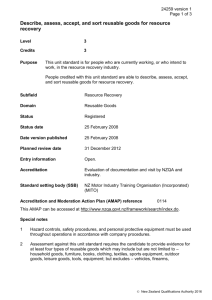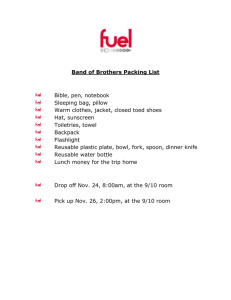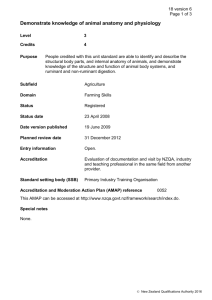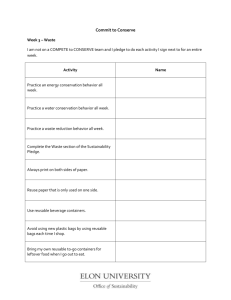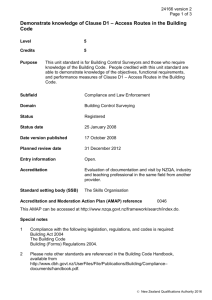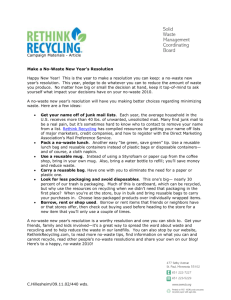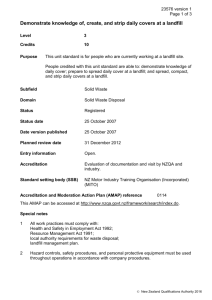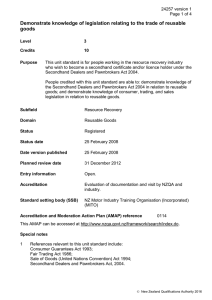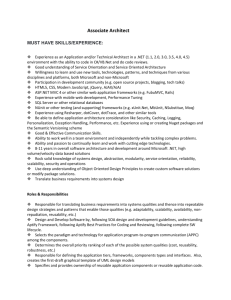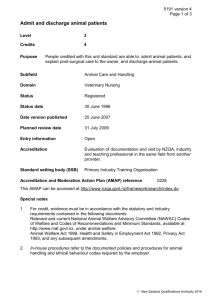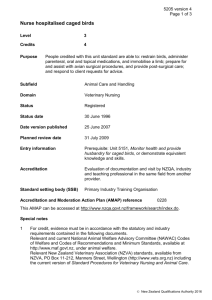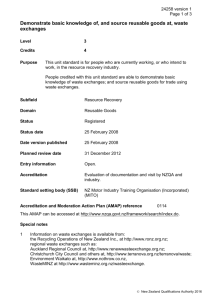24256 Demonstrate knowledge of the value of, and
advertisement
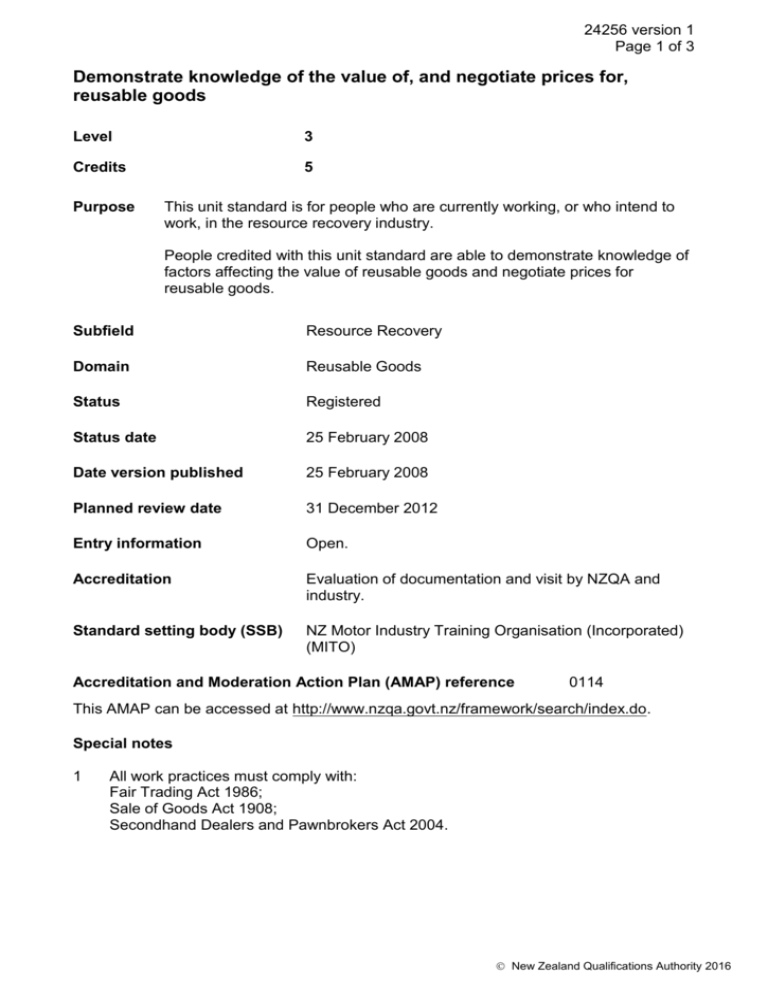
24256 version 1 Page 1 of 3 Demonstrate knowledge of the value of, and negotiate prices for, reusable goods Level 3 Credits 5 Purpose This unit standard is for people who are currently working, or who intend to work, in the resource recovery industry. People credited with this unit standard are able to demonstrate knowledge of factors affecting the value of reusable goods and negotiate prices for reusable goods. Subfield Resource Recovery Domain Reusable Goods Status Registered Status date 25 February 2008 Date version published 25 February 2008 Planned review date 31 December 2012 Entry information Open. Accreditation Evaluation of documentation and visit by NZQA and industry. Standard setting body (SSB) NZ Motor Industry Training Organisation (Incorporated) (MITO) Accreditation and Moderation Action Plan (AMAP) reference 0114 This AMAP can be accessed at http://www.nzqa.govt.nz/framework/search/index.do. Special notes 1 All work practices must comply with: Fair Trading Act 1986; Sale of Goods Act 1908; Secondhand Dealers and Pawnbrokers Act 2004. New Zealand Qualifications Authority 2016 24256 version 1 Page 2 of 3 2 For assessment against this unit standard candidates must either: negotiate on fewer than 6 occasions in one year for goods worth less than $2000 per item; or be a licensed secondhand dealer; or be authorised by the holder of a secondhand dealers licence to enter into transactions. 3 Definitions Company procedures means the documented methods for performing work activities and includes health and safety, environmental, and quality management requirements. They may refer to manuals, codes of practice, or policy statements. Price includes valuable consideration in any form, whether direct or indirect; and includes any consideration that in effect relates to the acquisition or supply of goods. Reusable goods refer to discarded resources that are able to be recovered without reprocessing or remanufacture. Typically these include clothing, textiles, household items, tools, sports equipment, bric-a-brac, furniture, and exclude motor vehicles and pawned goods. Elements and performance criteria Element 1 Demonstrate knowledge of factors affecting the value of reusable goods. Range at least two types of reusable goods. Performance criteria 1.1 Product factors affecting the value of reusable goods are identified and explained in accordance with company procedures. Range 1.2 product factors may include but are not limited to – condition, completeness, packaging, potential for repair, expected useful life, accessories; evidence relating to at least four factors is required. Market factors affecting the value of reusable goods are identified and explained in accordance with company procedures. Range marketing factors may include but are not limited to – availability, popularity, guarantee, historical significance, locality; evidence relating to at least three factors is required. New Zealand Qualifications Authority 2016 24256 version 1 Page 3 of 3 Element 2 Negotiate prices for reusable goods. Range at least two types of reusable goods from – mechanical, textile, furniture, demolition, garden, household, electrical, other. Performance criteria 2.1 Negotiations confirm the status and quantity of goods in accordance with company procedures and the Fair Trading Act 1986. Range status includes but is not limited to – nature, characteristics, suitability for a purpose; status may include – accessories, uses, performance characteristics. 2.2 Negotiations achieve an agreed price for the specified goods in accordance with company procedures and the Sale of Goods Act 1908. 2.3 Negotiation details are recorded in accordance with company procedures and the Secondhand Dealers and Pawnbrokers Act 2004. Range dealer’s record, verification, label. Please note Providers must be accredited by NZQA, or an inter-institutional body with delegated authority for quality assurance, before they can report credits from assessment against unit standards or deliver courses of study leading to that assessment. Industry Training Organisations must be accredited by NZQA before they can register credits from assessment against unit standards. Accredited providers and Industry Training Organisations assessing against unit standards must engage with the moderation system that applies to those standards. Accreditation requirements and an outline of the moderation system that applies to this standard are outlined in the Accreditation and Moderation Action Plan (AMAP). The AMAP also includes useful information about special requirements for organisations wishing to develop education and training programmes, such as minimum qualifications for tutors and assessors, and special resource requirements. Comments on this unit standard Please contact the NZ Motor Industry Training Organisation (Incorporated) (MITO) info@mito.org.nz if you wish to suggest changes to the content of this unit standard. New Zealand Qualifications Authority 2016
